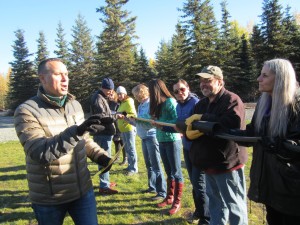Here at Adventure Associates we wholeheartedly believe in the value of experiential learning. For years we’ve seen its benefits and the breakthroughs it can create for both individuals and teams.
Admittedly, the concept of experiential learning is not a new one, since it appears even Confucius recognized its merits back in 450BC:
“Tell me, and I will forget. Show me, and I may remember. Involve me, and I will understand.”
 Regardless, we often still find ourselves in classrooms and auditoriums, watching slides flit across a screen or someone scribbling furiously on a whiteboard. What’s wrong with these approaches is that they are just not very engaging, especially if the learners are there because of a requirement rather than of their own volition or interest. This hampers our ability to absorb information.
Regardless, we often still find ourselves in classrooms and auditoriums, watching slides flit across a screen or someone scribbling furiously on a whiteboard. What’s wrong with these approaches is that they are just not very engaging, especially if the learners are there because of a requirement rather than of their own volition or interest. This hampers our ability to absorb information.
Experiential learning, on the other hand, can really accelerate the pace at which we learn. It’s one thing to be told theoretically how to handle conflict resolution or negotiation, and another to be placed in a scenario which requires those skills be put to the test. By actually living something you better understand the nuances and the techniques taught, which can then be tied to experience and filed away in a more readily accessible area of our brains.
When you’re actually “in it”, experiencing something first hand, you can’t help but be engaged. It makes mentally checking-out a non-issue. The same can’t be said for multi-hour presentations that don’t require any active participation, save fighting the urge to nod off.
Moreover, experiential learning allows a safe place to practice new techniques and processes without fear of failure. When we’re under the pressure of a real work project, even the most daring of us will fall back on the things we know best. Experiential training allows us to test the material we’re being taught and gain the confidence to apply it at work and in our lives going forward. And since we’re not on a work-imposed deadline, we can learn at our own pace, ensuring that we truly understand what we’re doing and why.
While experiential learning is powerful on its own, there are two other essential components: time for reflection and a chance to apply the insights gained. Through reflection we’re able to process what we’ve learned and formulate a plan for implementing it in our work. Then by applying these insights we’re able to test them for efficacy.
This cycle of experimentation just isn’t practical in day-to-day work operations, at least for the majority of us. For this reason, experiential learning is our best bet for trying on new behaviors and processes, and for ultimately realizing our true potential and not falling into the trap of doing the same things over and over with the same results.
- Team Building Lessons – How Much Time Should We Spend Planning? - May 7, 2018
- Team Building Lessons – Do We Try a New Approach? - May 2, 2018
- Team Building Lessons - May 2, 2018
Interested in learning more about our team building and training options?
We'd love to talk to you!
Request Proposal



Leave a Reply